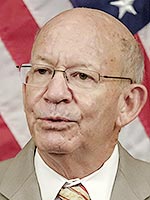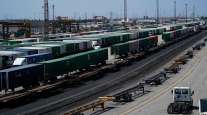Senior Reporter
Congressional Leaders Praise Tentative Rail Labor Agreement

[Stay on top of transportation news: Get TTNews in your inbox.]
The announcement of a tentative rail labor agreement was viewed as a positive sign by senior policymakers on Capitol Hill on Sept. 15.
House Speaker Nancy Pelosi (D-Calif.) pointed to the announcement’s potential benefits for commerce and workforce relations. She also touted the efforts from lead negotiators.
“The report of a tentative agreement between railroads represented by labor unions and the National Carriers’ Conference Committee is good news for our nation’s economy, our security and the well-being of the American people,” said the speaker in a statement.
“I commend President [Joe] Biden for his personal involvement and insistence on resolution and especially Labor Secretary Marty Walsh for leading the negotiations. I congratulate both parties for coming to terms that will avoid a strike and take a positive step forward in terms of respecting workers’ rights,” Pelosi added. “I also want to commend the representatives of the labor unions who wouldn’t leave the table without achieving justice for their workers.”
Rep. Donald Payne (D-N.J.), chairman of the House subcommittee on railroads, added, “I want to applaud President Biden and his team for their leadership and efforts to avoid a railway strike.”

Payne
“Even a temporary stoppage of America’s rail shipping could have cost our economy billions of dollars in lost activity and halted passenger rail service across the country,” Payne went on. “This tentative agreement should benefit workers with better pay and safer working conditions. I want to thank the rail unions and the railroads for staying the course and working it out. No one knows the economic devastation their agreement averts for our nation.”
“Hopefully,” Payne added, “this agreement will establish more trust between unions and rail carriers so we never have to face the possibility of such a devastating strike again.” Earlier this year, Payne sponsored a bill designed to update programs at the Surface Transportation Board to expedite freight rail service concerns.
The chairman of the Transportation and Infrastructure Committee, Rep. Peter DeFazio (D-Ore.) co-sponsored the legislation to focus on the economy.

DeFazio
“Today’s tentative agreement between rail workers and the railroads is a major accomplishment for workers who have fought for and won better pay — the highest wage increase in over 45 years — improved working conditions, and the sick days they need to see their doctors without penalty,” DeFazio said. “At a time when the railroads reap record profits, it is confounding that these changes could not have been agreed upon sooner. But thanks to the leadership of President Biden, Secretary Walsh, Secretary [Pete] Buttigieg, and the strong resolve and solidarity of labor, our rail workers will have the dignity and working environment they deserve.”
Referring to the freight-centric measure, DeFazio said in August: “This bill will level the playing field and provide railroad customers — many of which are transporting key food and energy products — the service they deserve. This bill will also provide the tools and guidance the Surface Transportation Board needs to fulfill its mandate and better regulate disputes among Class I railroads and their customers, weed out unfair practices and incentivize efficient operations. I look forward to putting these policies into action, empowering the board, and boosting competition in the freight rail industry.”
During the labor negotiations, Sen. Roger Wicker (R-Miss.), observed, “Halting rail service is counterproductive for both sides and would have devastating consequences for our country.” Wicker is the top Republican on the Commerce Committee on freight policy.
The parties announced they had reached a tentative deal that paved the way for averting a strike or lockout. Railroads and unions had faced a Sept. 16 deadline to arrive at an agreement.
With inflation affecting the economic landscape, stakeholders had warned a shutdown of freight rail would have contributed to difficulties to supply chain connectivity. Aspects of the freight supply chain continue to recover in the post-COVID-19 pandemic economy.
Want more news? Listen to today's daily briefing below or go here for more info:




